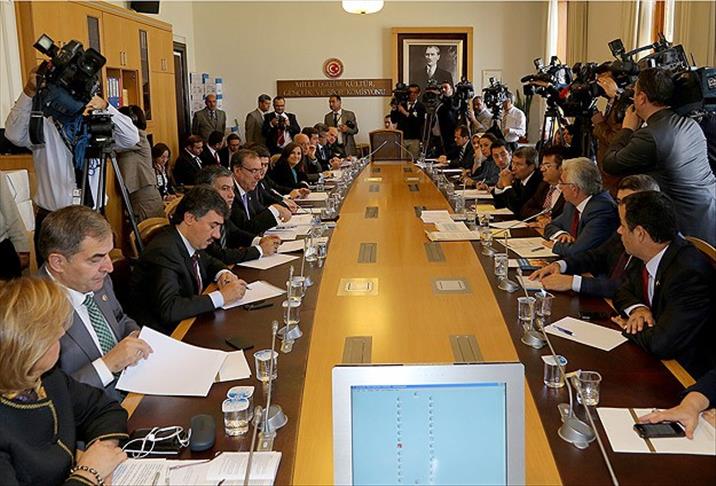
Answering a question about the dissolution of the Constitutional Conciliation Committee tasked with drafting a new constitution, Erdogan said the ruling AK Party had done all it could to draft a new constitution, but opposition parties halted the process.
“The Committee compromised on 60 articles for the new constitution, but the Chairman of the main opposition party Republican People’s Party (CHP) initially accepted to cooperate with the government in the amendment of these 60 articles in parliament but later changed his mind and asked for all four parties to come to compromise on these articles,” stated Erdogan.
When asked whether the shift in the opposition's position was due to the sensitivity of the definition of citizenship, Erdogan said his party and the government are ready to discuss the issue in all aspects, whereas the pro-Kurdish Peace and Democracy Party (BDP) was particularly unwilling to compromise.
Explaining that his definition of "Turkish" does not require belonging to a particular ethnicity- such as Turks, Kurds or any other ethnic group- but rather belonging to the nation of Turkey as a citizen, PM Erdogan said that the definition of nation is one of the key breakings points resulting in the dissolution of the constitutional conciliation committee.
“The BDP asks for using ‘people of Turkey’ instead of ‘Turkish people’ or 'Turkish nation' in the charter. Due to disagreement on such simple issues, the process of drafting a new constitution has taken more than 25 months while it was expected to be finalized in 12 months. In the end, the main actor in the issue, the parliament speaker, declared his withdrawal from the committee.”
The issue of drafting a new constitution was one of the main topics on the agenda of the newly elected Turkish Parliament in June 2011. Each of the four parties represented in the parliament- Republican People's Party (CHP), Nationalist Movement Party (MHP), Peace and Democracy Party (BDP) and ruling Justice and Development Party (AK Party)- declared three delegates to represent them in the Constitutional Conciliation Committee, a committee established in the Turkish Parliament to draft a new constitution starting in October 2011.
The committee worked on the constitutional process both thematically and structurally. The definition of citizenship was one of the thornier issues being handled by the Constitutional Conciliation Committee. The BDP has demanded that the issue be settled with a formula based on citizenship of the Turkish Republic in which citizens of the country should not be described as “Turkish.” The BDP opposes the use of terms such as “Turkish nation” or “Turkish” in the new charter.
The CHP and MHP, on the other hand, strongly oppose the BDP's proposal. The “Turkish nation” should remain in the constitution so as to maintain the unity of the nation, they emphasize, also noting that a nation is not the same as an ethnic identity, considering that a nation is usually made up of various ethnic groups.
Civil society and academics have also contributed to the process by publishing reports and holding meetings on the issue with most civil society institutions presenting their proposals to the Constitution Committee.
However, the committee could only agree on 48 articles at first, and 60 as of late. The articles could not be taken to the parliament after the CHP insisted it will not vote for the 60 articles if all four parties do not come to compromise on them.
Parliament Speaker and chairman of the Constitutional Conciliation Committee Cemil Cicek then withdrew from the committee and wrote a letter to the other parties informing them it was not possible to produce a draft of a new constitution.
This disruption does not mean the process has been completely closed, but that its recommencement will be delayed until after the coming local elections in 2014 and parliamentary elections in 2015.
by Kasım İLERİ
englishnews@aa.com.tr


